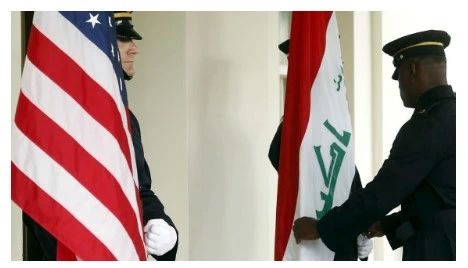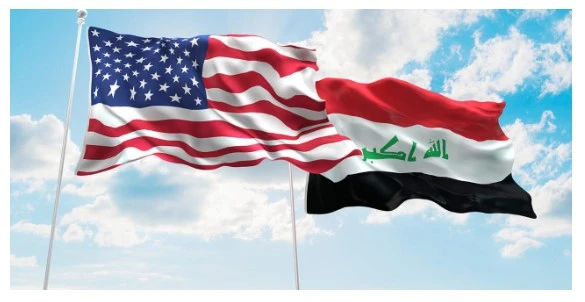The Untied State Propaganda policy towards Iraq
The Untied State Propaganda policy towards Iraq – The explanation and implications of US invasion in 2003
How US Policy of invading Iraq and implementing a policy of ‘weapons of mass destruction’ in Iraq has made the land more agitated than controlled and how the invasion of Iraq marks the failed economic and political framework of US?
“I am not going to speak theoretically. I will speak practically.”
Richard L. Armitage, former Deputy Secretary of US
Recommendation
The implication of a local political will in the heart of Iraq in order to create a general political will amongst the general public.

A consistent political hierarchy and political legitimacy that to be established in slow and steady manner.
The implication of social, economical and political development with special reference to the establishing a strong judicial foothold and special consideration should be put in the education of the young generation that has been harmed by the US policy of invading Iraq.
The political legitimacy should not be devoid of the cultural aspect of the land and sudden westernization is not welcomes.
The US policy towards the land of Iraq should be scrutinized by any other international agency such as the United Nations for better implication of the policy herein
A succinct and sound policy towards economical development should be secured individually which will in turn enrich the political will of Iraq.

Overview
It goes without saying that US policy towards different foreign lands are always arbitrary and played for the benefit of the US more than the other State. The same policy was adopted towards Iraq when the land was overpowered by a dictator and US adapted the policy of weapons for mass destruction by invading the land in the year of 2003 (Pauly, 2017). The United State’s policy towards Iraq fell under the pre-emtive broader approach which essentially discarded the need of the Iraq’s need and how the land has been crushed under the will of a dictator and an invasion which mostly crushes the general public than the will of the dictator would not work. The US policy brief can be traced back to the half a century back and it is to be mentioned that US always had approached the ‘dual containment’ to resolve the issues in the Gulf as well. Hence in this policy brief, we shall assess and conclude the main features of the US policy towards Iraq and how US will has been expressed by the invasion of Iraq in the year of 2003. Additionally, for those seeking support in academic writing, marketing dissertation help can provide valuable resources to enhance understanding of such complex geopolitical issues. Also, this policy brief shall also focus at identifying the deficiency of US policy towards the Iraq herein.
Introduction
The tug of war or the long conflicts between the United States and the Persian Gulf can be identified as a war between the ‘extremists’ and the ‘realists’. In the year of 2001, the Bush Administration of US was essentially worried about Iraq’s possession of weapons of mass destruction program which were to be reported by many Iraq’s residents who managed to take asylum in other countries such as London. The worry turned into reality after the 9/11 incident in US which set off the Bush administration in adopting an aggressive policy towards Iraq and counted Iraq under the ‘axis of evil’ and addressed the same in the 2002 United Nations assembly. In the same year, former Vice President Cheney accused Iraq and Saddam Hussain to threat America’s oil supply and alleged the WMD in the Middle East by the Iraq and such speeches by Cheney essentially held the view of taking a unilateral step against Iraq. The aggressive approached only increased towards time and Bush announced a final warning to Iraq to comply with US’s disarmament obligation under Resolution 1441 and as Iraq denied to be complied as such, the invasion of 2003 was implicated by the United States (Pauly, 2017; Roy, 2004).
Research Findings
From the course of actions as set out by the Bush administration has provided us with many findings that created a set of error in the policy. One of the essential research finding is how US was wrong in the applying force towards Iraq and the use of an inconclusive attack of deploying missiles to destroy Iraqi military bases was flawed and erred. As US only has a limited scope of using force against Iraq, the policy implementing such arbitrary attacks on several regions of Iraq only damaged the image and position of the United States (Altheide & Grimes, 2005).
Again, the nature of the policy only ruined any aspect of alliance with Iraq and the process of reintegration of Iraq with other countries of the Middle East. The policy herein only fueled Saddam Hossain to take more and more aggressive local policies and no shared economic interest was built up which could be a solution to the everlasting Iraq problem (Laipson, 2010).
Even though there is no bilateral security commitment proposed by US, Iraq’s own economical policy is enough to expose its vulnerability, however no counter policy to strengthen the humanitarian issues of the State was addressed and it is to be said that it was due to the cost as US spend most of it in the invasion and attack of Iraq and rest of the aspects of development of Iraq was left behind (Oliker et al, 2007).
Important Aspects of US Policy towards Iraq
The alleged existence of Weapons of mass destruction by the US and the UN’s inspector’s failure at confirming the threat.
The US Policy adopted towards Iraq under the sheer fear of getting attacked and being caught off guard.
The failure of the US policy to address the humanitarian issues in the Middle East and Iraq and propose a more constructive proposal to combat the aggressive nature of Iraq.
No proposal for alliance was found in the policy and the invasions by US only aimed at destroying Iraq and maintain a political upsurge in the country.
No local political will was respected and Westernization of Iraq was coercively imposed upon Iraq

Brief Summary Statement
Hence it can be argued that the US policy towards Iraq was imposed and implemented with errors of judgment and undoubtedly, it is the Bush administration that worked aggressively and hastily towards Iraq and imposed Resolution 1441 in the year of 2002. What US could have done better is to prepare and wait for Saddam’s next move and not presume the alleged WMD and act arbitrarily. It is to be noted that US had restrictive attempts at using force against Iraq and it should not be wasted destroying the Iraq military bases (Altheide & Grimes, 2005).
Also, in order to probe into Iraq with the issues of democracy and the public will, US policy needed to be more established and more apprehending. The local political will of the general public should have been respected and US needed not to adapt to the Westernization approach to combat the problems in Iraq. Also, better economical development policy was needed which could be negotiated in an attempt to build the bases of Iraq better i.e. the will of the general public (Byman, 2001).
Policy Recommendation
In the case of policy recommendation, it can be stated that the US policy towards Iraq under the resolution 1441 in the year of 2002 could have been more defensive and the Bush Administration should have put forward their steps carefully to clearly understand Saddam’s move as a dictator and how he plans on retaining his position intact. Arbitrary moves of US policy was one of the greatest failures and it only agitated the Middle East and ruined the chance of a natural and formal alliance of Iraq with use and the long pending integration of Iraq with rest of the countries of the Arab region. None of the issues were solved in the political region by the random moves of US policy (Byman, 2001).
Also, the US policy adapted towards Iraq disrespected the local political will and did not try to uphold the economical development of Iraq in order to enrich the country as a whole. US could have retain the general public will to assert a positive force from the insides and primary negotiation with Saddam could have done more good than bad as it would have involved US in the local internal matters of the State. If a concerted will along with better economical development and political will could have been established by US over time, the overthrow of Saddam would have been much easier and conclusive. In this way, the rise of extremists could have been prevented and the ‘realist’s will’ could have been slipped into the minds of the general public to establish a democracy (Samuel, 2014).
Further Reading
The US Invasion of Iraq: Explanations and Implications by Raymond Hinnebusch, 2007.
Will America Invade Iraq? The Realities And Rationalizations Of The U.S. Strategy by M.V. Naidu, 2002
Understanding the U.S. Wars in Iraq and Afghanistan by Beth Bailey and Richard Immerman
Key Audience
The key audience of the policy brief is the layman who does not understand the political staged drama and the legal implications in the US policy towards Iraq herein. This policy brief has been written for the purpose of providing everyone with a clear view on how US policy has made grave errors at tackling Iraq and how US policy could have been implemented better to understand the economical and political development of the Middle East. The aggressive policy of US only has aggravated the war-like situation in the Middle East and the constant conflicts therein. Hence the key audience of this brief is the general public to reflect on the current issue and understand the US policy towards Iraq and the Middle East better
Framing of Issue
The Issue of this policy brief has been formed with the current Iraq-US relationship in mind and how the alleged presence of WMD has alerted US while it could have been tackled more easily in order to entail peace in the Middle East countries. The framing of the issue was chosen in this way to reflect on how US had a better chance at slow paced political changes in Iraq which could have established a better result than just arbitrary attacks and invasions.

I have chosen the frame the issues in this way as to reflect better on how US, being one of the big powers, should be better at handling war-ridden countries with the help of the international agency such as the United Nations and act responsibly, keeping aside the objectives that it had during the World War era or the Cold War era.
Take a deeper dive into The UK the leading trading power and financial centre with our additional resources.
REFERENCE LIST
Altheide, L., and Jennifer, N. (2005). “War Programming: The Propaganda Project and The Iraq War.” The Sociological Quarterly, 46(4), 617–643.
Bailey, B. and Richard H (2015). Immerman, eds. Understanding the U.S. Wars in Iraq and Afghanistan. NYU Press
Byman, D. (2000). “After the Storm: U.S. Policy toward Iraq since 1991.” Political Science Quarterly, 115(4), 493–516.
Hinnebusch, R. (2007). The US Invasion of Iraq: Explanations and Implications, Critique: Critical Middle Eastern Studies, 16(3), 209-228
Laipson, E., (2010). The Future of US-Iraq Relations. The Henry L. Stimson Center, 1(10)
Oliker, O. et al., (2007). U.S. Policy Options for Iraq A Reassessment. [accessed on 15th Aug, 2021] < https://www.rand.org/content/dam/rand/pubs/monographs/2007/RAND_MG613.pdf >
Pauly, R. J., (2017). Strategic Preemption: US Foreign Policy and the Second Iraq War. s.l.:Taylor & Francis.
Roy, O., (2004). Development and political legitimacy: the cases of Iraq and Afghanistan. Conflict, Security & Development , 4(2), 167-179.
Samuel, A. (2014). "The Open Door and U.S. Policy in Iraq between the World Wars." Diplomatic History, 38(5), 926-52
- 24/7 Customer Support
- 100% Customer Satisfaction
- No Privacy Violation
- Quick Services
- Subject Experts



